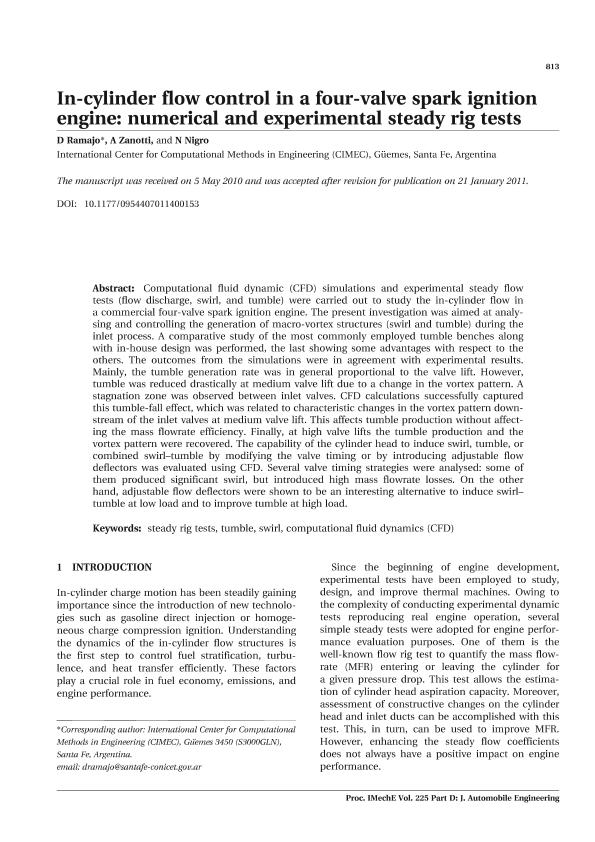Mostrar el registro sencillo del ítem
dc.contributor.author
Ramajo, Damian Enrique

dc.contributor.author
Zanotti, Angel Luis

dc.contributor.author
Nigro, Norberto Marcelo

dc.date.available
2017-02-13T20:45:25Z
dc.date.issued
2011-06
dc.identifier.citation
Ramajo, Damian Enrique; Zanotti, Angel Luis; Nigro, Norberto Marcelo; In-cylinder flow control in a 4-valve spark ignition engine: numerical and experimental steady rig tests; Professional Engineering Publishing Ltd; Proceedings Of The Institution Of Mechanical Engineers Part D-journal Of Automobile Engineering; 225; 6; 6-2011; 813-828
dc.identifier.issn
0954-4070
dc.identifier.uri
http://hdl.handle.net/11336/12929
dc.description.abstract
Computational fluid dynamic (CFD) simulations and experimental steady
flow tests (flow discharge, swirl, and tumble) were carried out to study
the in-cylinder flow in a commercial four-valve spark ignition engine.
The present investigation was aimed at analysing and controlling the
generation of macro-vortex structures (swirl and tumble) during the
inlet process. A comparative study of the most commonly employed tumble
benches along with in-house design was performed, the last showing some
advantages with respect to the others. The outcomes from the simulations
were in agreement with experimental results. Mainly, the tumble
generation rate was in general proportional to the valve lift. However,
tumble was reduced drastically at medium valve lift due to a change in
the vortex pattern. A stagnation zone was observed between inlet valves.
CFD calculations successfully captured this tumble-fall effect, which
was related to characteristic changes in the vortex pattern downstream
of the inlet valves at medium valve lift. This affects tumble production
without affecting the mass flowrate efficiency. Finally, at high valve
lifts the tumble production and the vortex pattern were recovered. The
capability of the cylinder head to induce swirl, tumble, or combined
swirl–tumble by modifying the valve timing or by introducing adjustable
flow deflectors was evaluated using CFD. Several valve timing strategies
were analysed: some of them produced significant swirl, but introduced
high mass flowrate losses. On the other hand, adjustable flow deflectors
were shown to be an interesting alternative to induce swirl–tumble at
low load and to improve tumble at high load.
dc.format
application/pdf
dc.language.iso
eng
dc.publisher
Professional Engineering Publishing Ltd

dc.rights
info:eu-repo/semantics/openAccess
dc.rights.uri
https://creativecommons.org/licenses/by-nc-sa/2.5/ar/
dc.subject
Steady Rig Tests
dc.subject
Tumble
dc.subject
Swirl
dc.subject
Cfd
dc.subject.classification
Otras Ingeniería Mecánica

dc.subject.classification
Ingeniería Mecánica

dc.subject.classification
INGENIERÍAS Y TECNOLOGÍAS

dc.title
In-cylinder flow control in a 4-valve spark ignition engine: numerical and experimental steady rig tests
dc.type
info:eu-repo/semantics/article
dc.type
info:ar-repo/semantics/artículo
dc.type
info:eu-repo/semantics/publishedVersion
dc.date.updated
2017-02-09T13:52:05Z
dc.journal.volume
225
dc.journal.number
6
dc.journal.pagination
813-828
dc.journal.pais
Reino Unido

dc.journal.ciudad
London
dc.description.fil
Fil: Ramajo, Damian Enrique. Consejo Nacional de Investigaciones Científicas y Técnicas. Centro Científico Tecnológico. Centro de Investigación de Métodos Computacionales; Argentina
dc.description.fil
Fil: Zanotti, Angel Luis. Consejo Nacional de Investigaciones Científicas y Técnicas. Centro Científico Tecnológico. Centro de Investigación de Métodos Computacionales; Argentina
dc.description.fil
Fil: Nigro, Norberto Marcelo. Consejo Nacional de Investigaciones Científicas y Técnicas. Centro Científico Tecnológico. Centro de Investigación de Métodos Computacionales; Argentina
dc.journal.title
Proceedings Of The Institution Of Mechanical Engineers Part D-journal Of Automobile Engineering

dc.relation.alternativeid
info:eu-repo/semantics/altIdentifier/url/http://journals.sagepub.com/doi/abs/10.1177/0954407011400153
dc.relation.alternativeid
info:eu-repo/semantics/altIdentifier/doi/http://dx.doi.org/10.1177/0954407011400153
Archivos asociados
